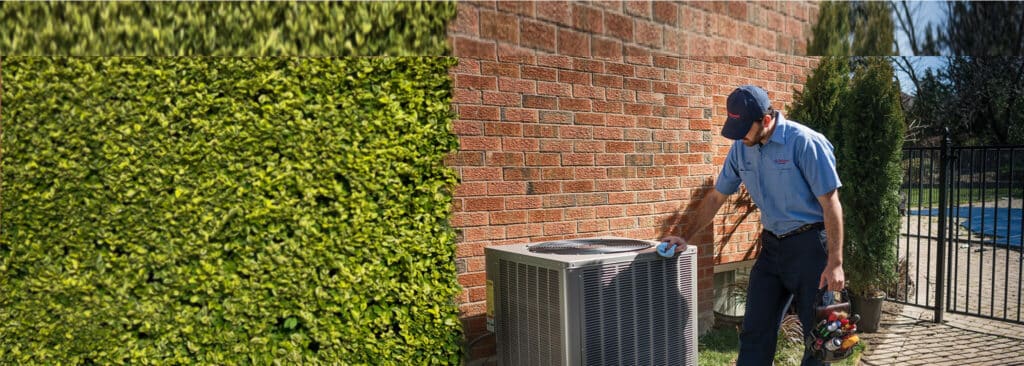General Questions about Air Conditioners
The age of your air conditioner is an important consideration when answering the question, do I repair or replace my system?
If you’re considering the repair route, you’ll want to compare repair costs to the price of a new air conditioner. If your AC is broken, a licensed Reliance™ technical expert will assess and let you know your options.
Looking to cut your energy bills? Advances in AC technology have greatly improved energy efficiency in recent years.
There are other important factors that could influence your decision to repair or replace an AC.
For instance, repairing a refrigerant leak or the AC compressor can be a costly venture, so weighing the pros and cons carefully is smart to do.
There are dozens of factors that could affect AC performance. Some issuescan be avoided by following a few simple maintenance tips. Other problems are more serious and should only be handled by licensed heating and cooling technicians.
Check for the following if your AC won’t turn on:
- Blown fuses or tripped circuit breakers.
- Your thermostat is set for cooling and to the correct temperature.
- A dirty air filter, which should be replaced if necessary.
- Blocked or closed registers and vents to ensure proper airflow.
- Obstructions around the condenser outside which may be blocking air flow. Remove weeds, grass, branches, vines and any object that may be leaning against the unit.
If there is still no cooling, we recommend calling a licensed technician. You can book a tune-up to get your AC inspected and cleaned as part of the regular recommended maintenance on your AC.
Are you finding that the air temperature differs from one room to the next, or from one floor to another? Uneven cooling (or heating) is fairly common in multi-story homes. Ductwork problems and dirty or clogged filters can add to uneven home temperatures.
Here are some considerations from our techs on how to solve uneven cooling in your home.
Are registers and vents blocked?
Things like carpets and furniture blocking registers and vents will limit or stop airflow. Move them out of the way so the cool air can circulate more easily.
Tip from a Tech: Homeowners should never fully close vents on the first floor of their homes. This could create pressure build up in the heating and cooling system, which can actually lead to everything from higher energy consumption to equipment failure.
Is your air filter dirty?
A dirty air filter restricts the air flow through and into the rooms where you need it. Ensure your filter is cleaned and changed as recommended by the manufacturer.
Are return air vents clean?
Registers and vents should be kept clean and free of any clutter that may impact air flow. Every couple of months, use your vacuum to clean them off. You’ll also be reducing dust and pollutants in the air you’re breathing.
Are there problems in the ductwork?
Blockages in your home’s ductwork can create uneven cooling in your home by restricting the flow of air. Alternatively, air leaks in your duct system could be the culprit. Leaks caused by holes in your ducts could provide too much air to some rooms and cause too little air flow in others.
Is there enough insulation in your attic?
Your home’s insulation does double duty throughout the year: it keeps you cool in the summer and warm in the winter. Inadequate quality or quantity of insulation can create a noticeable difference in temperature between the upper and lower floors of your home.
Tip from a Tech: If you have uneven cooling, change the fan switch on your thermostat from “auto” to “on.” In the “on” position, your system’s fan will circulate air even after the system cooling cycle goes off, helping to even out temperatures between different floors.
Packaged air conditioners.
In a packaged central air conditioner, the evaporator, condenser, and compressor are all “packaged” together in one cabinet. For this reason, it’s a good option for homeowners who have limited indoor space.
Packaged air conditioners use a duct system to distribute cool air. The AC unit is usually placed on a roof and tends to be a more common choice for small commercial buildings. Some packaged air conditioners can include heating functions, so a separate furnace isn’t required.
Split systems.
A split system for cooling is by far the most common kind of home comfort solution in Canada.
A split-system central air conditioner has both an outdoor unit (the condenser) and an indoor unit (the evaporator), hence, the ‘split’ system. Your furnace contains the evaporator coil. Your furnace blower motor is used to circulate the cool air through the ductwork of your home. In the event that a home can’t accommodate the ductwork needed to install central air, a split ductless system is an option.
Ductless or Mini-Split Air Conditioners.
Do you live in a home without ducts? Or maybe you don’t want to spend the money it would take to install ductwork for a central air conditioning system?
Ductless or mini-split air conditioners are alternatives to window air conditioners and similar to central air conditioners, with an outside condenser, and indoor units with blowers mounted on the wall, floor or ceiling. Tubing, which connects the parts and circulates refrigerant, and an electric and drain line run through a hole behind the indoor unit. Each indoor unit is controlled by a remote control.
The size of your new AC is critical to your home comfort. If the AC is too small for the square footage of your home, it will struggle to keep you cool on hot days.
If the AC is too large for your home, it will cycle on and off, wasting energy. It will also not effectively dehumidify your home, making it feel warmer and less comfortable.
In addition to considering the square footage of your home, a heating and cooling expert – like a Reliance Home Comfort® Advisor – will take in account other important factors, such as:
- Your family’s needs
- Specific region and climate in which you live
- Orientation of your home (for example, if it faces west)
- Size and age of your windows
- Your home’s ventilation system and ductwork
- Quality and quantity of your home’s insulation
- Age of your home
Don’t hesitate to contact us for a free, no-obligation, in-home consultation with a Home Comfort Advisor. Call us today, or book online.
If you’re looking for ways to cut your energy bill, check out these simple yet effective strategies.
Get a programmable or smart thermostat
They’re relatively inexpensive and can help save you a bundle. For instance, with a programmable thermostat, you can time your system to turn on an hour or so before you arrive home, helping avoid the costs of cooling an empty house. And there is a growing array of thermostats which can be controlled with mobile apps, which put better energy management literally in the palm of your hand!
Become a fan of ceiling fans.
While a ceiling fan doesn’t actually lower the room temperature, it can make you feel cooler by moving air over your skin. That way, you’ll be more likely to crank down the AC.
A bright idea: energy-saving light bulbs.
Incandescent bulbs are not only energy hogs, they generate more heat than you may think. Switch to more energy-efficient options – your AC and your wallet will love you for it.
Close the curtains and blinds.
The sun’s rays, strongest during the summer months, can heat up any room quickly. So draw curtains and blinds when you can, and especially on hot sunny days. Feeling ambitious? Plant a natural shade like a tree or tall shrub in front of windows that receive a lot of sun.
Avoid oven-cooking on hot days.
Instead of a heat-generating oven, consider cooking in a microwave or on outdoor grill.
Check your furnace for a dirty filter.
A dirty filter can restrict airflow, making your AC work harder than it needs to. Change the filter according to the manufacturer’s instructions, or more frequently if you have pets or suffer from allergies.
Rebates are great — no debates about it
Depending on what province you live in, you could receive attractive rebates when you upgrade your AC or purchase products that help you become more energy efficient, such as programmable thermostats. Visit your local utility website for more information on available rebates and offers.
Choose ENERGY STAR® certified ACs
ENERGY STAR certified central air conditioners have higher seasonal energy efficiency ratio (SEER) ratings and use less energy than conventional new models*. At Reliance Home Comfort, our experts can help you choose an ENERGY STAR certified AC that’s right for your needs. Schedule a no-obligation, in-home consultation with a Home Comfort Advisor today.
A new central air conditioning system is a big investment, and you want to ensure that the unit that is selected is perfect for your home – and for your home comfort needs. Selecting the best system without the advice of a heating and cooling expert can be tricky. Remember, we offer a free, no-obligation consultation with a Home Comfort Advisor that will answer any questions and concerns you may have.
Here are just a few of the things your advisor will consider before determining the most suitable and cost-efficient AC system for your unique needs:
Energy efficiency.
New ACs are generally 20% to 40% more efficient than minimum-efficiency models made even 10 years ago. An Energy Star qualified air conditioner will have a SEER of at least 14.5. The higher the rating, the more efficient your air conditioner will be, and the more energy savings it will deliver.
The right size for the right job.
Make sure your new AC is large enough to keep your home cool, but not too large that it wastes energy. In fact, an AC that is too big for your home will consume an excessive amount of electricity while actually reducing the overall energy efficiency. A Reliance Home Comfort Advisor will factor in the size of your home, its insulation, the climate and even the efficiency of your windows to determine the best system for you.
A good warranty.
Many respected brands now offer a 10-year warranty, with some models providing lifetime coverage on the compressor, the costliest part of your new air conditioner.
Is it quiet?
If you or your neighbours value silence, this can be an important consideration: generally central air conditioners are relatively quiet inside the home, but that doesn’t meant they aren’t stirring up a racket outside. If you have neighbours nearby, or like to sit outside even when the system is running, a quieter system will be appreciated by all.
Local utility rebates may influence your decision!
As you compare ACs, remember that your local utility may offer significant rebates for purchasing a high efficiency AC. At Reliance, we have helped thousands of homeowners across Canada participate in these rebate programs, and we can help you optimize your savings. Check your local utility’s website for more information on available rebates.
Get the right home comfort partner.
Finding a trustworthy AC contractor to install and maintain your new equipment is almost as important as the AC itself! Here are some of the top considerations when choosing an AC contractor:
- Is the AC contractor licensed, with a verification of bonding and insurance?
- Is the contractor established, with a track record of installations in your community?
- Can the contractor provide references that show they performed AC installation in a timely and professional manner?
- Does the contractor offer 24/7/365 support?
Does the contractor offer guarantees?
Tips from our techs
Shopping for a new air conditioner? Consider the following:
- Higher EER and SEER air conditioners are can help you save on your electrical bill.
- Pairing your AC with a furnace that has a variable speed blower motor will help increase your AC efficiency.
Be sure to visit the Ultimate Air Conditioning Guide to help determine the best central air conditioner for your home.
A little preventative action is always a good idea, even when it comes to your central air conditioner. Regular cleaning and a little maintenance could save you money in AC repair bills, and extend the life of your AC too. Here are some easy steps to keep your air conditioner running at its best:
Check to see if your furnace filter is dirty or clogged.
Your furnace blower motor is used to circulate AC-cooled air through your home. One of the simplest, easiest steps in maintaining your AC is changing your furnace filter on a regular basis. A clogged filter will restrict airflow, reducing your system’s efficiency and ability to effectively cool. Change the filter according to the manufacturer’s instructions, or more frequently if you have pets or suffer from allergies.
Clean the debris from your condenser and evaporator.
A buildup of debris in and around your air conditioner condenser can cause all kinds of AC performance issues, so it’s always smart to keep them clean and clear of debris.
Remove any leaves, weeds, bushes, grass, vines and tree branches near the condenser, and make sure that the area around your air conditioner is free of clutter or items that may block air flow.
Give the fins some love.
Maintaining your AC should include cleaning the aluminum condenser fins with a garden hose and sprayer. Always make sure your AC is off before spraying with water or cleaning the AC unit. Always turn off the breaker to ensure your unit doesn’t turn on unexpectedly. Ensure you’re spraying from the inside of the condenser out if possible.
Important: Never use a pressure/power washer – it may damage internal components!
Don’t have time to give your AC a proper cleaning? This service is part of the Reliance Cooling Tune-Up Service and also included in a Cooling Comfort Protection Plan.
Clean the condensate drain
Your air conditioner has the job of pulling humidity from the air, in addition to cooling it. To do this, your system pulls in hot, humid air and cools it through cold evaporator coils in the inside portion of your AC. When that happens, condensation/droplets form on the evaporator coil, which flow down a condensate drain line.
This drain line may become clogged or partially clogged with algae, mold or other debris over time, which can compromise your AC’s performance, lead to water in your basement or potentially damage your HVAC system.
Don’t have time to clean the condensate drain? Consider an AC tune-up. AC maintenance can take time and effort. A cooling technician from Reliance will take care of a lot of the maintenance work you may not have time for, like clearing and cleaning the condensate drain, in addition to inspecting major components. This could help you avoid unexpected repairs – and even extend the lifespan of your air conditioner.
For more cooling information check out:
13 ways to save on AC cooling costs
Top 7 things to consider when choosing a new central AC unit
How an air conditioner works








